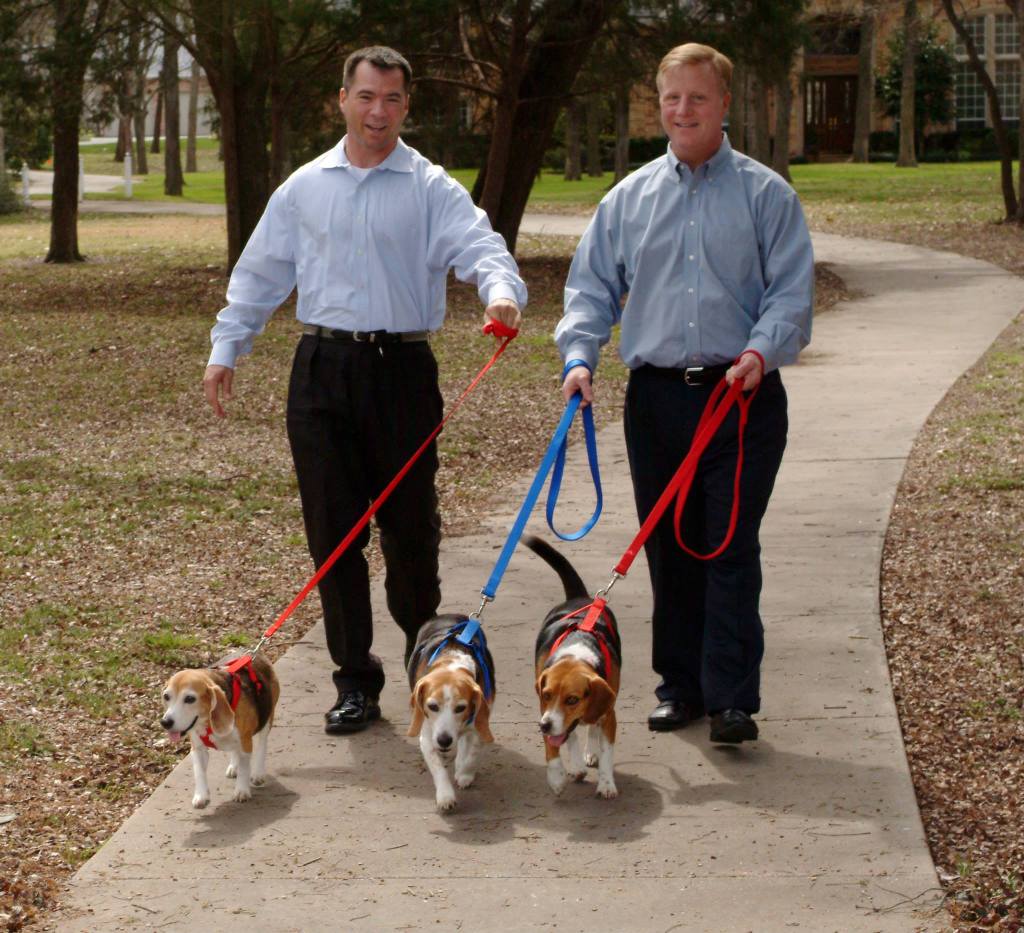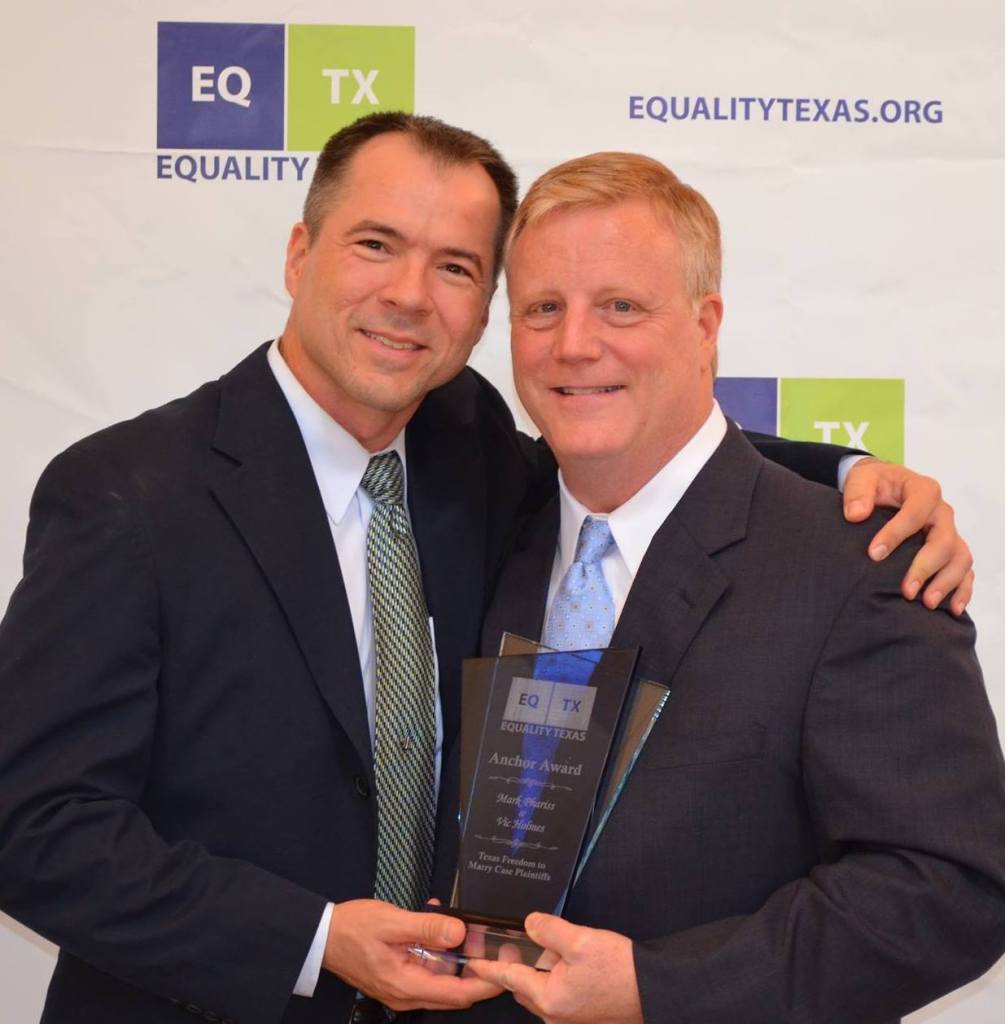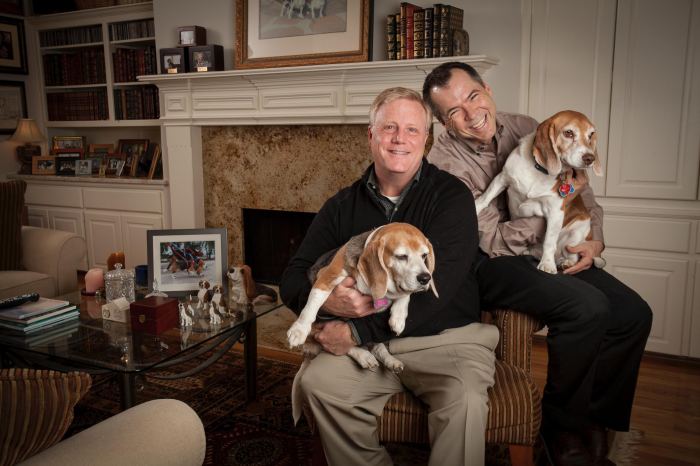After the U.S. Supreme Court struck down the Defense of Marriage Act last June in the Windsor case, Mark Phariss and Frank Stenger with San Antonio law firm Akin Gump Strauss Hauer & Feld discussed the idea that someone should sue Texas to bring marriage equality to the state. The pair became acquainted when Phariss practiced law in San Antonio from the mid-1980s to 2000.
Akin Gump, which had filed an amicus curiae brief for Windsor, agreed to handle the suit, but they needed plaintiffs. Because of previous connections with the firm, Phariss and his partner, Vic Holmes, joined Nicole Dimetman and Cleopatra De Leon in this historic effort. A federal court ruled in their favor in February 2014. The Fifth Circuit’s hearing for the state’s appeal is scheduled for Jan. 9.

Photos courtesy of Mark Phariss and Vic Holmes
In his job as an assistant general counsel with Expert Global Solutions, Phariss, considers and prepares for the best-possible scenario, the worst-possible scenario, and every type of scenario in between. That may be great for his career but perhaps burdensome as it relates to the suit—the potential ramifications were, and are, considerable.
Holmes spent 11 of the couple’s almost 18 years together in the Air Force living under the age Don’t Ask Don’t Tell. Incidentally, Holmes retired as a major after almost 23 years of service as an optometry tech, optician, and physician’s assistant just seven days after Obama signed the repeal of Don’t Ask Don’t Tell. He currently is a family practice physician’s assistant and a college instructor.
Joining Phariss and Holmes at the interview in their living room in Plano were two of their three beagles: Jake equally distributing kisses, and Betsy snoring throughout. Abby assessed the situation before retiring to her perch on the master bed.
“We are hopeful the Fifth Circuit will rule as the four circuits other than the Sixth have ruled—that these bans are unconstitutional—by the end of January or early February, the stay will be lifted, and we will achieve marriage equality in Texas.” – Mark Phariss
Why is getting married important to you?
Vic: Because I love him.
Mark: And I love him.
Vic: And he’s so cute.
Mark: We’ve been together more than 17 years, and we managed to survive 11 years of commuting when he was in the military. During that entire time it never crossed our minds to ask, “Is this worth it?”
Vic: My mom is madly in love with my dad, and vice versa. When they look at each other even now, it’s just like they’re seeing each other 35 years ago. What they have is indescribably beautiful. When I was growing up and starting to realize I was gay, that was the thing I thought I was never going to get. First, marriage was just completely out of the question, but I never thought I would find somebody who did that for me. And he [Mark] still does. But when Neel [Lane, lead counsel] got up to tell Judge Garcia our side of the story—“This is what they’ve had to go through. These are the things they’ve had to endure.”—it occurred to me that that was me. And when he released his opinion, that was the first time I honestly thought I would have what my parents have.
How hard was the decision to join the lawsuit?
Vic: I was fine with doing it, and I was fine with not doing it. I had horrible visions of news reporters running up and down the street and a kid getting run down. That was really the biggest concern that I had. But Mark was a bit more apprehensive.
Mark: As we moved forward to meet the lawyers and Nichole and Cleo, we started having second thoughts. I called Frank and said, “I want to be very clear. Just because we’re flying down doesn’t mean we haven’t reserved the right not to do this.” But when we got there, and the lawyers were so passionate about the cause…
Vic: I was not expecting them to be so keyed up to get this sorted out.
Mark: They were extraordinarily passionate and articulate about the wrong they saw and the need to right it. At least for that day, we overlooked our concerns. We all agreed we didn’t want any publicity. The plaintiffs would stay in the background. But as we approached the filing, I again was getting cold feet.
Vic: He didn’t have butterflies. He had eagles flapping around.
Mark: I finally called Frank and said, “You all need to get this lawsuit filed or I’m going to back out!”

Photos courtesy of Mark Phariss and Vic Holmes
Why the cold feet?
Mark: It was about security. I wasn’t out at my job, and I was worried about the ramifications there. I’ve been a general counsel before. I want to be a general counsel again. I was concerned it would stunt my career path. I was concerned about our safety. I was concerned about our dogs. We were worried about Westboro Baptist Church marching in front of our house. We didn’t know.
That’s a legitimate concern. They’ve done lesser things.
Mark: Exactly. On the Monday it was filed, I’m working and out of the blue I get a call from NPR. Then I get a call from the San Antonio Express-News. And we wanted no publicity! I came home literally sick to my stomach. As the week progressed, they wanted us to go on live Friday morning with MSNBC.
Vic: From that point forward, everything we say is a reflection on every one of us. We don’t want to do anything stupid, because it would be, “Oh, look how stupid the LGBT people are.” We weren’t just us anymore. We were everyone else.
You were like the poster guys for marriage equality in Texas.
Vic: It’s not really what you grow up wanting to be.
Mark: We’re very cognizant of that. We don’t want to say the wrong thing or not say it in the right way. That would not be helpful.
We’re up to 35 out of 50 states that have legalized same-sex marriage. How do you see Texas playing out in light of all of that momentum?
Mark: My guess, which is no better or worse than anyone else’s, is the Supreme Court will not immediately take the Sixth Circuit’s appeal. I think they will wait to see what the Fifth Circuit does. We are hopeful the Fifth Circuit will rule as the four circuits other than the Sixth have ruled—that these bans are unconstitutional—by the end of January or early February, the stay will be lifted, and we will achieve marriage equality in Texas. If the Fifth Circuit rules against us, it’s very likely that our case will be taken at the same time as the Sixth Circuit case. I think the appeal or appeals will be heard next term, which starts in October, with the decision coming down in June 2016.

Photos courtesy of Mark Phariss and Vic Holmes
You went from what you called semi-closeted to what I’m calling the poster guys for marriage equality. How has the reality of that huge shift compared to your perception of what you would face?
Vic: The two things that have impacted me the most is, one, I get recognized in places. I was in an elevator going to my office, and a guy said [the lawsuit] was such an amazing thing to do and he was so happy because now he had hope. Two, in terms of the people in my office, everyone has just been really, really awesome about it and supporting the whole process.
Mark: The press has been far more [of an undertaking] than we had anticipated. It hasn’t been unpleasant, now that we have gotten used to it. I communicate with Jonathan Capehart of MSNBC now. How cool is that? But another thing I didn’t anticipate was the overwhelming outpouring of support. We really thought there would be more negative reaction. That has not been the case.
Vic: When we got back from the original hearing where Judge Garcia gave his ruling, I walked into my classroom to give a lecture. About halfway across the room, I suddenly realized all of the students were applauding.
Mark: It’s been very positive. There have been a couple of instances at the Huddle House in Gun Barrel City, where we have a lake house. We’ve had the sense someone is glaring at us. And someone did write the Huddle House saying they should not be serving gays. I’ve asked if they’ve had any other negative reaction, and the simple fact of the matter is they haven’t.
Vic: The guy across the street from us is almost 88. His point of view is, he doesn’t understand it and he doesn’t believe in it, but it’s not his place to judge.
Mark: He doesn’t approve of same-sex marriage. On the other hand, he likes us. We’ve gone to dinner with him. His wife bakes us cookies. They’re really wonderful.
Vic: That’s a win, frankly, because you’re seeing us. You’re not seeing an issue standing in front of you.
Vic, how did the Don’t Ask Don’t Tell policy impact you and the relationship?
Vic: It was pretty bad. No one really knew what the policy meant, especially in the beginning. Did it mean you could be gay? Did it mean you couldn’t be gay? That you couldn’t say anything about it? If you did say something about it, what counted as saying something about it? There was so much ambiguity, and some folks took advantage of that and made other people’s lives miserable.
It’s so hard to live two lives. The hardest part for me throughout all of that was trying to remember what I was supposed to be doing [when he visited Mark on weekends] and trying to reconcile that with what I was actually doing, and keeping up with what they thought that I was doing and where they thought I was going. That’s what that all came out to with Don’t Ask Don’t Tell.

Photo courtesy of Mark Phariss and Vic Holmes
I’ve heard you don’t fight. What’s your secret?
Mark: What do we have to fight about? We’re very blessed. We love each other. We have wonderful dogs. We like to do more or less the same things. I’m not overly fond of his sci-fi but he’s not overly fond of my genealogy. Yet we still do it.
Vic: He sees dead people, and I cut them open.
Mark: Vic is part Cherokee, so his ancestors were forcibly removed in the Trail of Tears. The ironic thing, my great-great-great grandfather was a Minuteman in the American Revolutionary War and fought the Cherokee in that war. Vic and I have always made jokes that our ancestors fought and we love. Who knows whether our ancestors looked at each other and didn’t shoot each other?
Interview by Jana Hunter





































